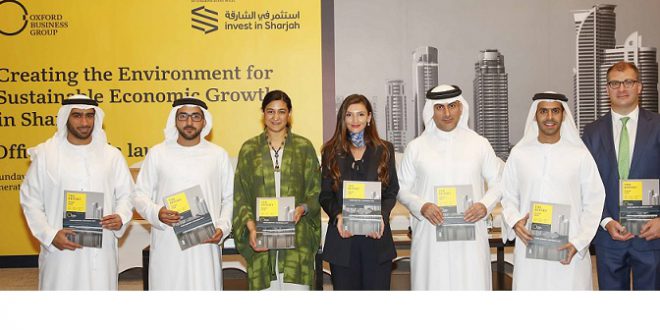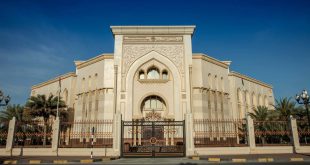The 2018 Oxford Business Group report for Sharjah has shown that the emirate’s policy of diversification and its success in attracting foreign direct investment is driving the economy towards new heights.
The document, ‘The Report Sharjah 2018’, provides an in-depth analysis of the most prevalent sectors and industries, highlighting the move away from hydrocarbons and towards a diverse and innovation-led economy, stating: ‘Sharjah authorities have been undertaking a range of measures to boost foreign investment flows, supported by competitive advantages such as strong connectivity… and a culture of entrepreneurship.’
The report goes on to reinforce Sharjah’s attractiveness to foreign investors in terms of facilities and services, saying the emirate is ‘home to a growing network of free zones – the emirate punches above its weight in terms of commerce and is highly diversified by regional standards, with oil and gas contributing less than 6% to GDP and no individual sector accounting for more than 20%.’
Continuing its theme of overseas businesses either beginning or expanding their operations in Sharjah, the report said that the emirate attracted AED912m ($248.2m) worth of foreign direct investment in 2016 – a record amount, according to the Sharjah FDI Office, also known as Invest in Sharjah (IIS). In April 2018, IIS announced that the emirate had registered AED5.97bn of FDI in 2017, representing a significant increase on the previous year.
Among the main contributors to Sharjah’s GDP were manufacturing; real estate; wholesale and retail trade; financial services; construction; mining and quarrying; professional, scientific and technical activities; and transportation and storage.
The session saw the participation of a number of prominent speakers including Sheikh Fahim bin Sultan Al Qasimi, Executive Chairman, Department of Government Relations and Chairman, Higher Committee for Digital Transformation; Marwan bin Jassim Al Sarkal, Executive Chairman of Shurooq; Khaled Al Huraimel, Chief Executive Officer of Bee’ah; Mohammed Juma Al Musharrakh, Chief Executive Officer of the Sharjah FDI Office (Invest in Sharjah) and Najla Al Midfa, CEO, Sharjah Entrepreneurship Centre.
Manufacturing:
In keeping with its history of being the industrial heart of the UAE, the largest component of Sharjah’s GDP according to the 2017 data was manufacturing, worth AED15.7bn ($4.3bn), or 16.9% of its total gross domestic product. The Oxford Business Group reports that the emirate has maintained its success in developing its industrial and manufacturing sector through a network of two free zones and 19 industrial zones, which continues to grow.
The document states: ‘Industry and manufacturing in Sharjah benefit from a low cost base, developed infrastructure and connectivity. As a result, Sharjah is one of the most important industrial and manufacturing centres of the UAE and the wider GCC.’ Manufacturing may become even more important in the years ahead, with the government estimating that it will account for around 25% of GDP by 2025.
Innovation and Education:
With regards to creating an innovative and educated population, the report draws attention to Sharjah’s ‘particular emphasis on innovation and quality as it positions itself as a centre for education within the UAE and the wider region’, underscoring it as home to two of the Middle East’s highest-ranking universities. It also highlighted the emirate’s efforts in ‘developing a culture of entrepreneurship, strengthened by support from the authorities, its well-developed education sector and its lower cost base,’ singling out the Sharjah Entrepreneurship Centre, Sheraa, as a prime bolster for start-ups.
Finance Sector:
The financial and insurance sector’s contribution to the emirate’s GDP was AED9.5bn ($2.6bn) in 2017, equivalent to 10.3% of the total and 11% of non-oil GDP, according to preliminary data from the Federal Competitiveness and Statistics Authority. This figure was up from AED8.66bn ($2.4bn) in 2016 at current prices, or 10.1% of GDP and 11% of non-oil GDP. Recent years have seen the sector steadily growing in size, not only in absolute but also in relative terms, having expanded from 7.9% of GDP and 8.8% of nonoil GDP in 2010. According to credit ratings agency Moody’s, the banking sector grew at an annual rate of 12.7% from 2012 to 2017.
Reflecting on Sharjah’s inspiring journey towards economic excellence, and years of dedication, integrated work and commitment invested by the Sharjah Investment and Development Authority (Shurooq), Marwan bin Jassim Al Sarkal, Executive Chairman of Shurooq, said: “In the last few years Sharjah has underwent a substantial transformation in its economy to servicing the growing investment opportunities and demands made by local and international markets. Our partnership and involvement in the Oxford Business Group’s (OBG) 2018 report is part of our integrated function in both communicating and promoting Sharjah’s ever-growing economic infrastructure with transparency and quantitative results.”
He explained: “Similar to what we’ve done with OBG since 2016, the report plays a key role in boosting our visibility in, both, planning and results in our local SME sector and in our local competitiveness index. The volume of analysis presented allow investors and readers to fully grasp the milestones achieved in Sharjah’s economic growth, and its upcoming plans to further sustain this into new and emerging markets.”
He added: “Our integrated efforts with our public and private counterparts form the backbone of Sharjah’s diversified and strategic economic growth, and our partnership with OBG reflects on our corporate mission and vision to further strengthen Sharjah’s position as a premiere investment destination inFshe the Gulf region and wider MENA.”
Commenting after the launch, Oliver Cornock, OBG’s editor-in-chief and managing editor for the Middle East, said that moves to develop key growth sectors within the economy and cultivate entrepreneurial activity were already beginning to deliver results.
“Our report shows that Sharjah has taken steps to capitalise on its prime regional position and central location in the UAE, with ports on both the Gulf and the Gulf of Oman, while also strengthening the appeal of its commercial, educational and cultural institutions,” he said. “With rising international oil prices likely to provide an added economic boost, all indications point to a bright outlook.”
The Report: Sharjah 2018 provides a detailed sector-by-sector guide for investors, alongside a contribution from His Highness Sheikh Dr. Sultan bin Mohamed Al Qasimi, Supreme Council Member and Ruler of Sharjah. Other high-profile personalities interviewed for the report include: Sheikh Sultan bin Ahmed Al Qasimi, Chairman, Basma Group, and Chairman, ARADA; Sheikha Bodour bint Sultan Al Qasimi, Chairperson of Sharjah Investment and Development Authority (Shurooq); Khalid Jasim Al Midfa, Chairman, Sharjah Commerce and Tourism Development Authority; Marwan Al Sarkal, Executive Chairman, Shurooq; Hatem Al Mosa, CEO, Sharjah National Oil Corporation.
The Report: Sharjah 2018 marks the culmination of more than 12 months of field research by a team of analysts from Oxford Business Group. The publication assesses trends and developments across the emirate, including those in macroeconomics, infrastructure, banking and others.






